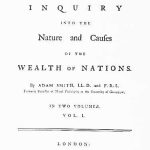In last week’s article, I discussed some of the arguments Yoram Hazony gives in his book Conservatism: A Rediscovery in favor of an empiricist procedure in ethics that supports working within a particular national tradition and against the rationalist deductive method of those who without empirical evidence defend the supreme value of freedom by postulating it arbitrarily as an axiom. I tried to show that one could support the self-ownership principle by an empirical argument that appealed to human nature. In this week’s article, I’d like to look at how Hazony applies his view of tradition to American history.
Before doing so, though, I want to comment further on Hazony’s deprecation of “rationalism” in ethics. He says,
Enlightenment liberalism is a poorly constructed framework for understanding political affairs, and the poor quality of the theory stems, first and foremost, from the fact that it is a sub-species of the failed philosophical enterprise of Cartesian rationalism. Descartes believed he had uncovered the method for unfailingly ascertaining universal truth…. But it was all folly. There is no way to reach a final determination of the nature of the physical universe by moving from self-evident premises through infallible deductions to unassailable conclusions. Descartes’ Principles of Philosophy is today regarded as such an embarrassment that it is not studied anywhere. The same is true of Kant’s a priori physics. (p. 127)
Hazony contrasts this failed method with the successful “empiricist method of Newton’s Principia (1687).” Hazony is right that Newton’s physics was more successful than Descartes’s, but he exaggerates the badness of Descartes’s physics; Newton was influenced by Descartes’s laws of motion. It’s odd that Hazony would suggest Kant’s physics is not studied anywhere; hasn’t he heard of Michael Friedman’s massive Kant’s Construction of Nature (2013)?
But I don’t propose to challenge Hazony about physics. Suppose that he is entirely right about physics. Why would it follow from the failure of a priori physics that a priori deduction is the wrong procedure for metaphysics and ethics? Hazony might reply that philosophy is part of natural science, as Willard Van Orman Quine famously argues in “Epistemology Naturalized.” In my view, an unresolved problem with that view is that the thesis that philosophy is part of science is not itself part of science. If Hazony disagrees, I would ask him which science says that philosophy is part of science? Physics certainly does not.
Let us put this aside and turn to Hazony’s defense of tradition. By no means, Hazony says, is he a relativist who merely catalogs various traditions and denies that there is an objective truth about ethics.
I have proposed a theory of truth that is based on a real capacity of the individual human mind—the capacity to discern an improvement in the scheme of things that is applied in explaining and permitting relevant action in a given domain. A political theory based on such an account of truth recognizes that truth in the political and moral realm is real. It is found in those norms, or rules of behavior, that permit the causes of human health and prosperity to be effective within a nation, tribe, or family, thereby allowing its members to grow strong and the community itself to propagate through the generations…. There is no relativism, nihilism, positivism, or historicism here. (p. 204)
Hazony’s confidence is misplaced. Group survival and prosperity seems an implausible criterion for morality: what helps the survival of a bad society would seem rather to be bad and not good.
Hazony applies his ideas about group survival and prosperity to America through an interesting argument. The British system of government was a good one, and the American Federalists, under the intellectual leadership of Alexander Hamilton, aimed to emulate the British system as much as possible. The policies the Federalists favored continued in the “American System” favored by Henry Clay and Abraham Lincoln, and these policies should guide us today. He says,
But in the wake of war with Britain from 1812 to 1815, a new generation of nationalists emerged calling for a renewal of Hamiltonian economic policies…. This nationalist coalition supported what Clay called the “American System” which sought to end economic dependence on foreign imports … the nationalist economic ideas of Hamilton and Clay were taken up by the American Whig Party and then put fully into effect by Abraham Lincoln…. Economic nationalism guided the policies of Lincoln’s Republican Party during the long period of ascendancy from the Civil War into the twentieth century. (pp. 89–90)
Readers of Tom DiLorenzo will be startled by this, as the very programs that he shows in books such as Hamilton’s Curse to be economically harmful are the ones Hazony praises. It will come as no surprise that I agree with DiLorenzo, but rather than go over the controversy here, I’d like to raise two other points. First, although Hazony has firm views about economics, he deems it unnecessary to discuss economic theory. Perhaps he would respond that he need not do so, because America grew prosperous during the era under consideration, when the policies he favors were followed; but this leads us to my second point. Hazony has not shown that America prospered because of these policies, and the truth of this point does not depend on acceptance of the economic theory I take to be correct. For all Hazony has shown to the contrary, America might have done better with other policies.
I shall conclude with something that leaves me puzzled. A glance at the book’s notes suffices to show that Hazony is a scholar of considerable learning, but it is curious that he fails to mention two authors. In the section “Paradigm Blindness” at the beginning of chapter 3, he closely follows the famous account of paradigms given by Thomas Kuhn in The Structure of Scientific Revolutions, but Kuhn’s name does not appear in the book. Further, in section 2 of chapter 4, he asks, “How do we determine what is good and true in politics and morals? Three principal answers contend for our attention” (p. 111). The three answers are biblical tradition, Enlightenment rationalism, and “the answer of Nietzsche.” This is a paraphrase of Alasdair MacIntyre, in After Virtue and other books, but he too is not mentioned. Why these omissions? Does Hazony think the discussions of these authors so well-known to readers that it would insult their intelligence to mention them? I do not know.





